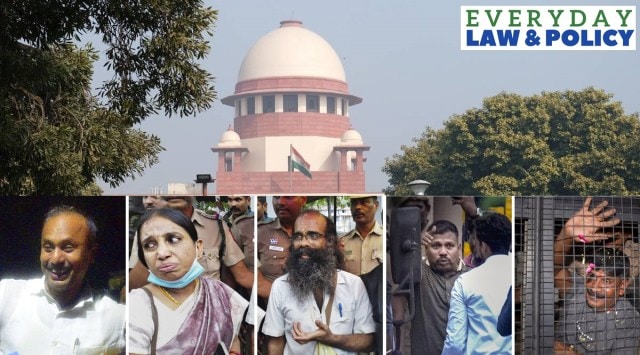Latest Comment
Post Comment
Read Comments
 The Supreme Court on November 11 ordered the release of all the remaining Rajiv Gandhi assassination case convicts, (L-R) Ravichandran, Nalini Sriharan, V. Sriharan alias Murugan, Robert Payas and Jayakumar. (PTI Photos)
The Supreme Court on November 11 ordered the release of all the remaining Rajiv Gandhi assassination case convicts, (L-R) Ravichandran, Nalini Sriharan, V. Sriharan alias Murugan, Robert Payas and Jayakumar. (PTI Photos)The government on Thursday (November 17) moved the Supreme Court seeking a review of the court’s November 11 order freeing all six convicts who were still in jail in the Rajiv Gandhi assassination case.
The Centre has argued that the order by a Bench of Justices B R Gavai and B V Nagarathna granting remission to the convicts was passed without hearing it (the Centre), that the order suffers from “errors apparent on the face of record”, and that it falls “foul of principles of natural justice”.
According to the Constitution, any ruling by the Supreme Court is in the normal course final and binding, and it becomes the law of the land. It is considered final because it provides certainty for deciding future cases.
However, the Constitution also gives, under Article 137, the Supreme Court the power to review its judgments or orders. This provision forms the legal basis for the filing of a “review petition”.
A review petition must be filed within 30 days of pronouncement of the judgment. Except in cases of death penalty, review petitions are heard through “circulation” by judges in their chambers. They are usually not heard in open court.
Lawyers in review petitions usually make their case through written submissions, and not oral arguments. The same judges who passed the original verdict usually also hear the review petition.
There are narrow, specific grounds on which a review petition can be entertained. Therefore, the court has the power to review its rulings to correct a “patent error” — but not “minor mistakes of inconsequential import”.
In a 1975 ruling, Justice Krishna Iyer said a review can be accepted “only where a glaring omission or patent mistake or like grave error has crept in earlier by judicial fallibility”.
In a 2013 ruling, the Supreme Court laid down three grounds for seeking a review of a verdict it has delivered:
(i) the discovery of new and important matter or evidence which, after the exercise of due diligence, was not within the knowledge of the petitioner or could not be produced by him;
(ii) a mistake or error apparent on the face of the record; or
(iii) any other sufficient reason. In subsequent rulings, the court specified that “any sufficient reason” means a reason that is analogous to the other two grounds.
The government has said that the convicts who sought remission did not make the Union of India a respondent in their plea “despite it being a necessary and proper party” to the issue. “This procedural lapse on the part of the petitioners resulted in non-participation of Union of India in subsequent hearings of the case,” it has said.
The review petition has also argued that the November 11 remission order “has been passed…by erroneously placing reliance on” the earlier order passed on May 18 in the case of Perarivalan, which was, in fact, not applicable to the six people released later. The “majority of [these] appellants were foreign nationals and had a distinct and more serious role in comparison to” Perarivalan, the government has argued.
According to the Centre, “granting remission to terrorist of foreign nation, who had been duly convicted in accordance with the law of land for gruesome offence of assassinating the former Prime Minister of the country, is a matter which has international ramification and therefore falls squarely within the sovereign powers of the Union of India”.
Also, “non presentation of such crucial facts, going into the root of the matter has resulted in patent and manifest errors apparent on the face of record creeping into the final judgment passed by this Hon’ble Court…and miscarriage of justice”.
It is rare for the Supreme Court to both admit reviews and to overturn an original decision in a review.
It did agree to review its 2018 verdict in the Sabarimala case, but refused to review its ruling seeking a probe into the Rafale deal.
In 2019, the Supreme Court recalled its directions in a March 20, 2018 verdict that had effectively diluted provisions of arrest under the Scheduled Castes & Scheduled Tribes (Prevention of Atrocities) Act. The Centre had sought a review of the judgment which had allowed grant of anticipatory bail under the Act.